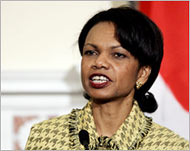Taiwan warns new law raises war fears
China’s new anti-secession law will heighten fears of war, Taiwan Prime Minister Frank Hsieh has said as the US and the EU voiced concern over escalating tensions in the region.

“The peaceful status quo has been altered. The present situation arouses concerns for war,” Hsieh told legislators on Tuesday.
He said Beijing had misjudged Taipei‘s determination to safeguard its democracy, as angry Taiwanese lawmakers decapitated paper effigies of Chinese President Hu Jintao and Prime Minister Wen Jiabao.
The Taipei government has demanded Beijing “sincerely apologise to the Taiwanese people for their grave mistake”.
China‘s parliament passed the legislation on Monday, giving the military a legal basis to attack Taiwan if it moves towards independence.
Undeterred, Beijing lashed out at the island for trying to “mislead”, “hoodwink” and “distort” its citizens out of ulterior motives.
Attempt to mislead
“It’s a pure attempt to mislead and distort out of ulterior motives,” an unnamed spokesman of China‘s Taiwan Affairs Office was quoted as saying by the official Xinhua news agency.
|
“The peaceful status quo has been altered. The present situation arouses concerns for war” |
“The objective is to hoodwink the Taiwan compatriots and the world opinion, again stir up confrontation in the Taiwan Straits, and seek an excuse for the Taiwan independence forces to create trouble,” the spokesman said.
With China bolstering its military capabilities and cross-strait tensions growing, alarm bells have been ringing in the United States.
“We view the adoption of the anti-secession law as unfortunate. It does not serve the purpose of peace and stability in the Taiwan Strait,” White House spokesman Scott McClellan said.
The issue is expected to be high on US Secretary of State Condoleezza Rice’s agenda when she visits China on Sunday.
US support
McClellan did not spell out a precise response from Washington and restated US support for the “one China” policy and said the US “does not support Taiwan independence”.
 |
|
The anti-secession law is thought |
“We oppose any attempt to unilaterally change the status quo. We don’t want to see a unilateral attempt that would increase tensions in the region. So this is not helpful,” said the White House spokesman.
The European Union, which is considering lifting an arms embargo imposed on China in 1989 after Beijing‘s crushing of pro-democracy protests, urged both Beijing and Taipei to avoid inflaming tensions.
“The EU urges all sides to avoid any unilateral action that could stoke tensions,” the union said in a statement.
“The EU will be worried if this passage of a law referring to the use of ‘non-peaceful means’ negated recent signs of rapprochement between the two sides.”
Neighbourly concern
Traditional US allies Japan and Australia also voiced concern and called on the neighbours to desist from war, while countries close to China such as Russia, Pakistan and Syria welcomed the developments.
On Tuesday Taiwan newspapers called for self-restraint and dialogue while China‘s state-run press defended the law as a “work of reason”.
In a commentary, Xinhua said the law was supported by all Chinese and Taiwanese except “the very tiny handful of ‘Taiwan independence’ secessionist forces”.
“It is no surprise that they are terrified at it and do all they can to stigmatise it,” the agency said.
Diplomacy
The 10-article law calls for the use of “non-peaceful means and other necessary measures to protect China‘s sovereignty and territorial integrity”, if all else fails.
This will be necessary “in the event that the ‘Taiwan independence’ secessionist forces should act under any name or by any means to cause the fact of Taiwan‘s secession from China“, the law said.
Analysts said it was unlikely China would go to war and would instead use diplomacy to urge the US and others to pressure Taiwan President Chen Shui-bian to back off moves towards independence.